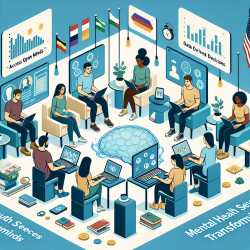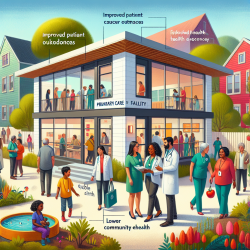Introduction
In the realm of youth mental health services, timely access and effective interventions are critical. The ACCESS Open Minds project, a Canadian initiative, has embarked on a transformative journey to address these needs. This blog post delves into the findings of the research article "A minimum evaluation protocol and stepped-wedge cluster randomized trial of ACCESS Open Minds," highlighting how practitioners can enhance their skills and improve outcomes for youth.
Key Insights from ACCESS Open Minds
The ACCESS Open Minds project focuses on five primary areas: early identification, rapid access, appropriate care, seamless transitions between services, and active engagement of youth and families. The study utilized a stepped-wedge cluster randomized trial to evaluate the effectiveness of these interventions across 14 sites in Canada.
Implementing Data-Driven Strategies
Practitioners can leverage the following strategies based on the study's outcomes:
- Early Identification: Implement community outreach and awareness programs to encourage early self-referral or referral by others. Utilize tools like the online early identification guide provided by ACCESS Open Minds.
- Rapid Access: Ensure that youth receive an initial evaluation within 72 hours of referral. This can be achieved by deploying trained clinicians and utilizing multiple access points, including walk-ins and digital platforms.
- Appropriate Care: Offer evidence-informed interventions within 30 days of the initial evaluation. Focus on youth-friendly, non-stigmatizing environments that align with the youth's goals.
- Continuity of Care: Foster collaboration between services to eliminate age-based transitions and ensure continuous care tailored to the youth's needs.
- Engagement of Youth and Families: Involve youth and families in service design and evaluation to ensure services meet their needs and preferences.
Encouraging Further Research
The ACCESS Open Minds project underscores the importance of engaging all stakeholders in research and evaluation processes. Practitioners are encouraged to conduct further research in their local contexts to refine and adapt the ACCESS model. This can lead to more personalized and effective mental health services for youth.
Conclusion
The ACCESS Open Minds project provides a robust framework for transforming youth mental health services. By implementing data-driven strategies and engaging stakeholders, practitioners can significantly improve mental health outcomes for young people. For a deeper understanding of the research and its implications, practitioners are encouraged to explore the original research paper.
To read the original research paper, please follow this link: A minimum evaluation protocol and stepped-wedge cluster randomized trial of ACCESS Open Minds, a large Canadian youth mental health services transformation project.










